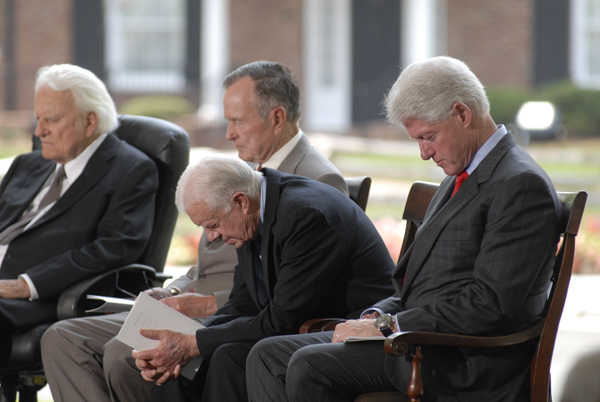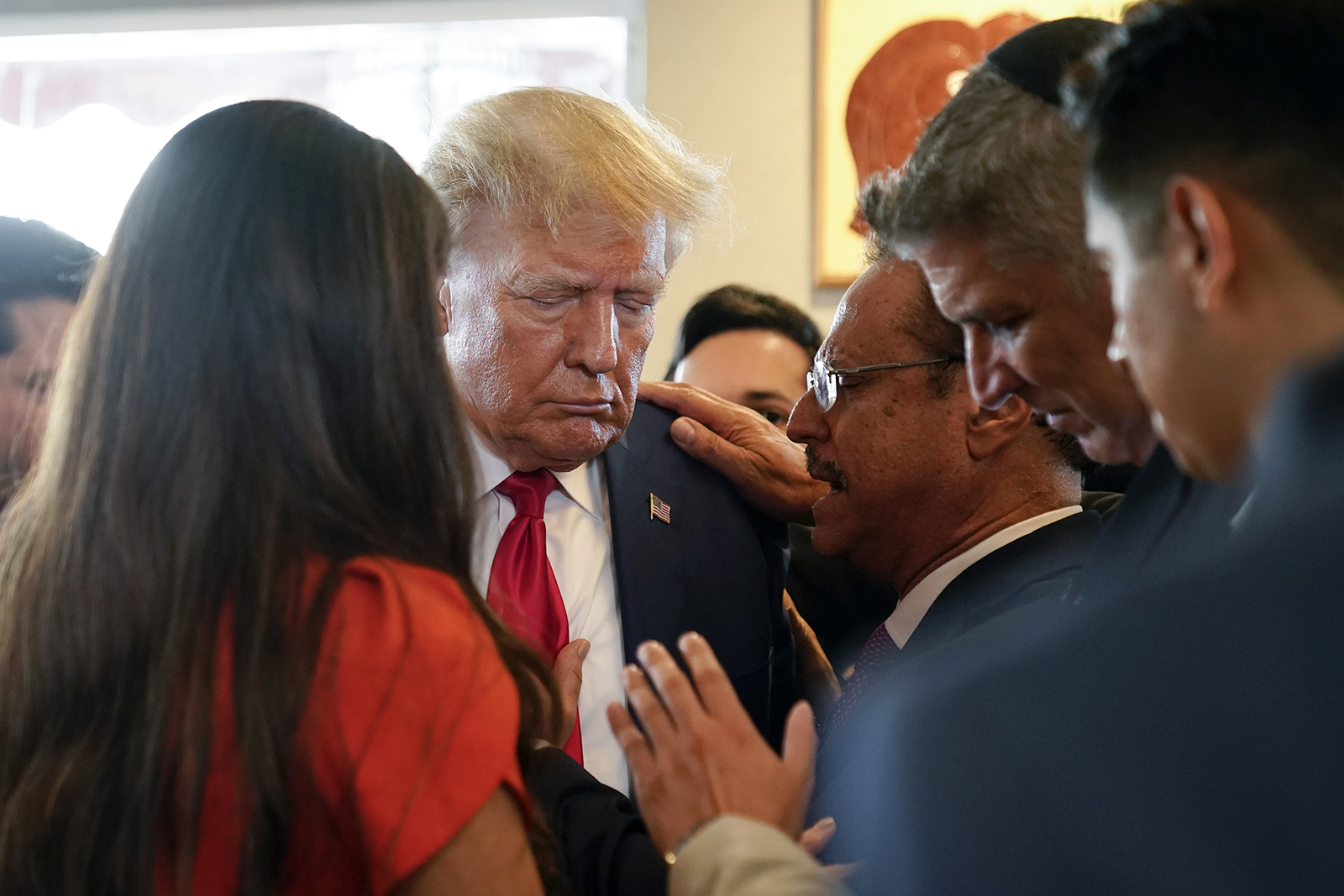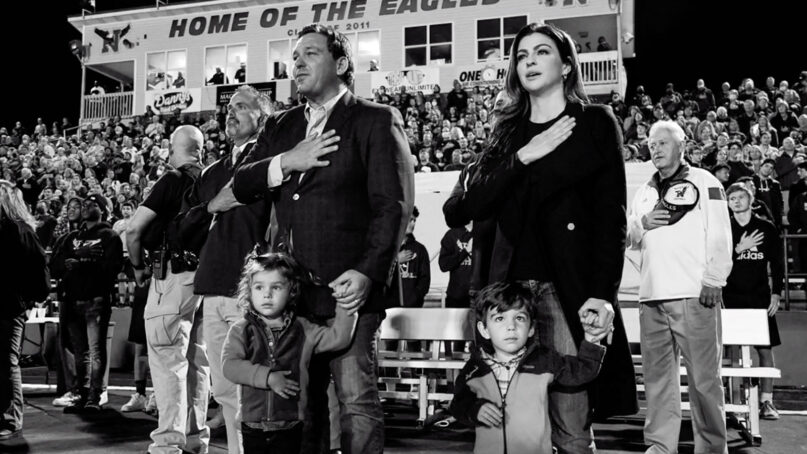(RNS) — Florida Gov. Ron DeSantis is a cradle Catholic who calls himself a Catholic and worships in Catholic churches. But, as Molly Olmstead demonstrates in her latest piece in Slate (“Will Anyone Buy Ron DeSantis’ Religious Muddle?“), he looks like an evangelical Christian, walks like an evangelical and quacks like an evangelical.
So he must be … a Republican candidate for president.
You can understand why. White evangelicals are the base of the GOP, these days constituting a good third of the Republican presidential vote. In the 2022 midterms, evangelicals voted for Republican congressional candidates 86% to 12%, the biggest margin ever recorded. That puts them into the territory of the Democratic Party’s Black Protestant base, which in 2022 voted blue 92% to 6%.
Yet, pace Olmstead, DeSantis’ muddling of his baptismal water is kind of a dog-bites-man story in today’s GOP.
We might go all the way back to Dwight Eisenhower, who never so much as alluded to his Jehovah’s Witnesses upbringing. Or to Richard Nixon, who covered up his Quaker roots. But let’s focus on the post-1970s era, when the religious right emerged as a political force to be reckoned with.
For starters: Ronald Reagan. He grew up as a devout member of the Disciples of Christ, and if in later years he was not a regular churchgoer, he retained his abiding faith. Beginning with the 1980 campaign, he kowtowed to conservative evangelicals and kept his Disciples identity to himself.
George H.W. Bush was a starchy Northeast Episcopalian, but that didn’t stop him from assuring evangelical pastors around the South that he considered himself “born again.” As for George W., he never identified with the United Methodist denomination he belonged to, instead pretending to the evangelical faithful that after a misspent youth he’d had his come-to-Jesus moment on the beach with — who else? — Billy Graham.
John McCain was an Episcopalian who let it be known that he attended a Baptist church in Phoenix. The year he ran, also-ran Mitt Romney, who could hardly hide his LDS identity, made strenuous efforts to tell evangelicals that his faith was like theirs. They weren’t buying it, and when he ran successfully for the GOP nomination in 2012, he barely mentioned religion.
Such GOP evasiveness is in sharp contrast to the straightforward religious self-identification of most Democratic presidential candidates. Jimmy Carter was a Baptist who was happy for people to know that he taught Sunday school. As far from a Sunday school teacher as Bill Clinton was, he happily advertised his own Baptist identity.

Billy Graham (far left) with former Presidents (from left) George H.W. Bush, Jimmy Carter and Bill Clinton in Charlotte, N.C., on May 31, 2007. RNS photo courtesy of Billy Graham Evangelistic Association
Barack Obama made so bold as to address his mainline Protestant denomination (the United Church of Christ) at the beginning of the 2008 campaign cycle, at which time Hillary Clinton also wore her Methodism on her sleeve. And, of course, Joe Biden is a rosary-carrying Catholic who never misses the chance to go to Mass.
Even among the GOP candidates who don’t need to don evangelical costume, there’s a tendency to prevaricate. Pat Robertson changed his profession from pastor to TV executive when he ran for president in 1988 and Mike Huckabee managed to hide away all the tapes of the sermons he gave as a Baptist pastor before running in 2008.
One step down ticket, there was Sarah Palin, a dyed-in-the-wool Pentecostal who in the course of running for vice president in 2008 never said she was. Not to mention Mike Pence, who in his run for the vice presidency in 2016 wouldn’t tell anyone where he went to church.
Then there’s the curious case of Ted Cruz, the Texas U.S. senator and an evangelical who doesn’t look, walk or quack like one. Desperate to be the evangelicals’ choice in 2016, he announced his candidacy at a Liberty College convocation — and told a conversion story about his father, not himself. No wonder that, despite eking out a victory in Iowa’s evangelical-rich Republican caucuses, he never really connected.
Which brings us, as it must, to Donald Trump.
He was confirmed in a Presbyterian church in Queens, New York, and for much of his life identified as a Presbyterian. But the pastor he cherished was Norman Vincent Peale, the celebrity pastor of Manhattan’s Marble Collegiate Church whose mega-bestseller, “The Power of Positive Thinking,” helped Trump in his belief that whatever he wants to be true is in fact true.

Former President Donald Trump prays with pastor Mario Bramnick, third from right, and others at Versailles restaurant on June 13, 2023, in Miami. (AP Photo/Alex Brandon)
As president, Trump not only kowtowed to evangelicals, he gave them just about whatever they wanted, from anti-abortion justices on the Supreme Court to an embassy in Jerusalem. While he rarely darkened a church door, he suffered his evangelical advisers to lay hands on him in the Oval. But he never pretended to be one of them.
Until, possibly, a couple of weeks before the 2020 election, when he said in a written response to a series of questions put to him by Religion News Service, “Though I was confirmed at a Presbyterian church as a child, I now consider myself to be a non-denominational Christian.”
As usual, Trump managed to have his finger on the popular pulse, or at least to know enough to rely on those who do — in this case Paula White, the nondenominational megachurch pastor and prosperity gospel purveyor, who as his chief religious adviser relayed the RNS questions to him.
On Monday, American religion stats guru Ryan Burge posted a Substack piece showing that nondenominational Christians have become far and away the largest non-Catholic religious grouping in the country, now weighing in at more than 20% of the population. Most of these “nons,” as he calls them, are of course evangelicals of one species or another.
What kind of non is Donald Trump? Who knows? Who cares? It’s the perfect evasion for the GOP’s evader-in-chief.






